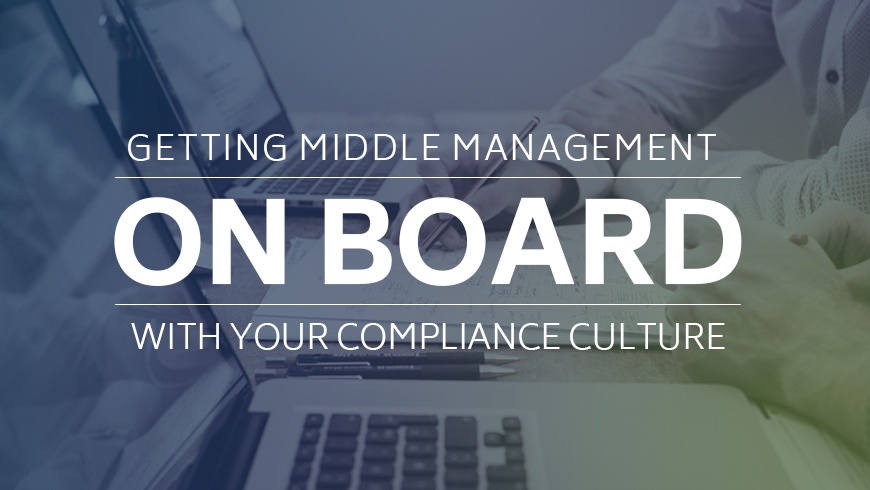Getting Middle Management On Board with Your Compliance Culture
Published: May 2, 2016
Last Updated: Jan 19, 2024
Promoting a culture of ethics and compliance is a fundamental component to the success of any organization. Although sometimes difficult to realize, the actual benefit of an ethics and compliance program exists in its ability to reinforce good decision making and ultimately steer us away from trouble. After all, just one mistake can leave you on the wrong side of the law, not to mention the financial drain and damage it can have on your company’s reputation. To create a culture that values ethics and compliance, we must realize a critical component: the buy-in. Simply put, everyone in the organization needs to be on board with the program.
From the C-suite and upper management to middle management, veteran employees and entry-level staff, ethics and compliance extends to all levels of the organization, affecting every person and department. A single person’s decision to disregard his or her commitment diminishes the integrity of the pyramid and increases the risk of nonconformity in every department below.
Positioned at the center, middle management weighs in as one of the most important players in maintaining the strength of an ethics and compliance program. They are typically the segment most unaware of how powerful their influence is on the organization. A majority of employees look to their direct manager for guidance and will base at least part of their opinion of workplace ethics on the actions of that manager. We can all think back to a time when a former supervisor said or did something that still sticks with us today. Whether good or bad, odds are the memory we recall is not particularly significant. Maybe it was a joke they told, a compliment they gave, or perhaps the way they responded to a problem. The point here is that even the smallest decisions made by middle management can have a lasting impact. If middle managers don’t consistently apply an ethical approach, employees will be quick to take note and more likely to follow suit.
The Potential Problem
Many issues regarding the involvement of middle management stem from their relationship with executive-level leaders. For example, feelings that upper management place too much focus on achieving material goals related to financials, sales, and cost controls may create the assumption that soft goals like ethics and compliance are expendable instead of reaching the more quantifiable goals. Unless these soft goals are reinforced by executive-level leaders as meaningful and rewarding, middle management may view the existence of these goals as a formality and not of any real importance.
Communication is Key
Reliable communication between employees, middle management, and top-level executives is one of the most important aspects of creating and maintaining a compliance culture. If employees feel they cannot voice concerns to middle management or likewise if middle management is discouraged from speaking with upper-level executives, the entire company will find it incredibly difficult, if not impossible to identify and promptly address compliance gaps.
It is imperative that upper and middle management work together to create an environment that champions communication, i.e. a workplace where employees feel comfortable expressing concerns and ideas, and managers are exceptional listeners.
To rectify the disconnect between executive leaders and middle management while inspiring middle management to get more involved with the creation and implementation of the organization’s compliance culture, both parties must take ownership of the following responsibilities:
- Communicate regularly (with each other and employees) about compliance with ethical goals, the value of those goals, and specific expectations.
- Lead by example and often speak about remaining compliant.
- Listen (executives to middle management, and middle management to employees); ask managers and employees directly about their challenges with compliance and welcome their opinions, suggestions, or concerns.
- Discuss how compliance initiatives will impact particular groups of people and why compliance is important.
- Be transparent about how ethical values and compliance influence management decisions.
- Anticipate ethical issues before they arise and be able to recognize them immediately when they occur.
- Encourage questions when ethical action is unclear.
- Provide consistent and general guidance regarding how ethical values apply to dilemmas.
- Delegate resolutions.
- Incorporate compliance in middle management performance reviews.
- Create opportunities for middle management to work with peers on resolving issues.
The Grand Takeaway
Executive-level leaders and middle management must demonstrate the importance of placing equal value on financial and ethical goals. They must also be willing to lead by example, explicitly discuss expectations, and make themselves available to answer questions, as well as coach and mentor others.
See below how Iron Mountain embraced their culture of compliance for multiple assessments throughout their organization:





